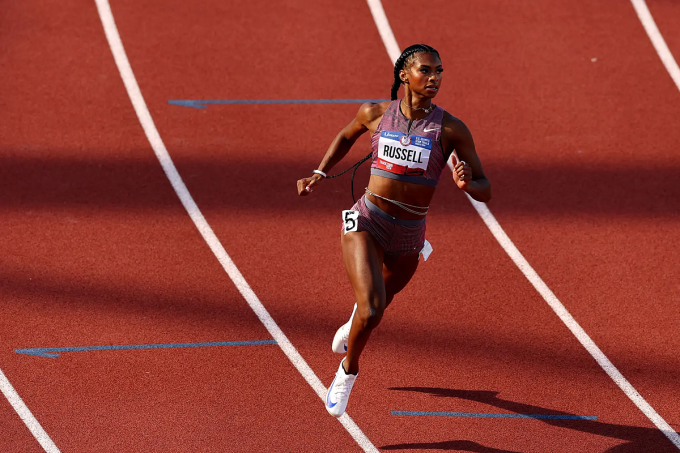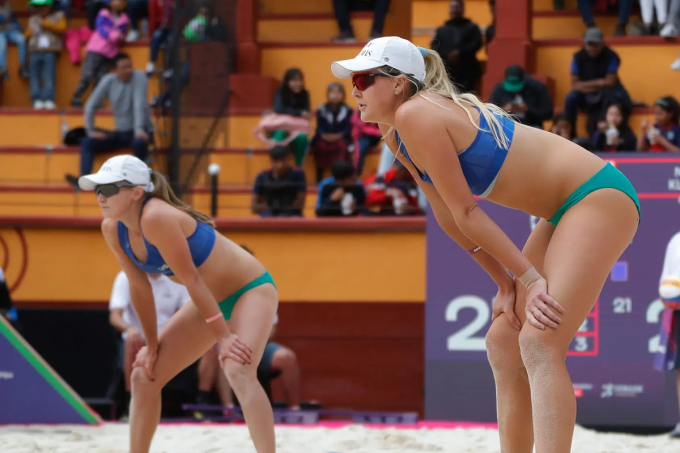Olympic athletes often pay attention to eating enough protein, drinking plenty of water, and adding snacks right before and after training to have enough energy.

The 2024 Olympics open in Paris, France, on July 27, but athletes have been preparing for the sporting event for months. According to sports medicine experts, athletes maintain strict training and eating schedules, with carefully calculated nutrition regimens. They shared with Time their eating secrets in the race for Olympic gold.
Wrestler Helen Maroulis
Helen Maroulis is the first American female wrestler to qualify for three Summer Olympics. At 32, she is the oldest woman to ever compete in the event. According to Helen, nutrition played a major role in her success, especially when she had to gain 120 pounds to compete with the other "seeds".
Having suffered a serious brain injury after competing, Helen learned the importance of choosing the right foods for brain health. "My three rules are to eat well, sleep well, and exercise regularly. I don't break any of them," she says.
During her training, she aimed to consume 1,500 calories a day. For breakfast, she had four fried eggs and some broccoli, and drank cow's milk. She had two snacks a day of sliced apples, almond butter, or sugar-free organic bread. For lunch and dinner, she cooked steak and sweet potatoes. On busy days, she swapped out the menu for spinach, some eggs, and chicken.
Helen stresses the importance of staying hydrated. She often drinks a protein shake after a workout, squeezing some fresh lemon into the water.
Hurdle runner Masai Russell
Masai Russell competes in the 100m hurdles for the US track and field team. She believes that eating well is the most important part of her training regimen.
“You can put all your effort into training, but if your body doesn’t have the right nutrition, it won’t function at its best. I don’t have enough energy to stay on track if I don’t eat a lot,” Masai said.
The 24-year-old athlete, who works with a nutritionist every month, starts her day at 8 a.m. She eats a lot of carbs and protein, like two to three eggs, two pieces of bacon, home fries, and a green smoothie. The hearty breakfast gives her enough energy to get through the day, especially the four hours she spends on the track.
Training usually starts at 1 or 2 p.m. Before hitting the field, Masai has a snack of fruit, granola, and honey. After training, she drinks a plant-based protein shake to ensure muscle maintenance.
"After a while, I realized that drinking protein after a workout helped my muscles feel less sore the next day. For dinner, I might have baked chicken, a burrito with brown rice, black beans, corn, sour cream and cheese," she says.
Russell always makes sure to drink plenty of water and electrolytes, because sometimes plain water isn't enough on hot days.
Fencing athlete Mitchell Saron
The 23-year-old fencer makes sure he eats enough nutrition to optimize his athletic performance. Mitchell's "animal-based" diet is similar to keto, focusing on meat from grass-fed animals such as beef, lamb, and venison. He also enjoys ocean fish, pickled vegetables, organic fruits, and raw honey.
He typically uses butter, beef tallow, ghee, or unsalted coconut oil when cooking. Mitchell doesn't drink alcohol, and he often drinks electrolyte drinks that contain salt and no sugar. "The biggest change from my non-training days is that I pay attention to what I eat," he says.
He said the change helped him increase his energy levels and deal with the absent-mindedness or brain fog he used to suffer from.
Mitchell doesn't count calories, but he does pay attention to protein. He aims to eat 160-180 grams of protein a day. One of his favorite foods is a free-range beef tenderloin.
“I get out a high-quality wooden cutting board and cut each piece beautifully, chopping up some mango and kiwi to serve alongside. Occasionally, I add sauerkraut or other fermented foods like kimchi,” he says.
He likes to have Greek yogurt mixed with grass-fed collagen protein for dessert. Sometimes he combines raw cocoa powder with blueberries and raspberries.
Beach volleyball duo Taryn Kloth and Kristen Nuss

Taryn Kloth and Kristen Nuss have been beach volleyball partners since college. The two are preparing to compete in their first Summer Olympics. Since the pandemic hit in 2020, they’ve been paying more attention to their nutrition, paying close attention to their bodies’ dietary needs. They’ve found that protein, carbs, and hydration are key to having plenty of energy.
Taryn, 27, likes to start her day with an English muffin topped with eggs, avocado and turkey or ham. It’s her favorite meal of the day. For lunch, she has an egg quesadilla and an apple with lactose-free Greek yogurt. She also adds a protein bar before a workout if she feels like she needs a boost.
"After every workout, I come home, cut potatoes into leaves and put them in the oven, eat them with a vegetable like cauliflower and some protein," she said.
Meanwhile, Kristen, 26, had a piece of toast, scrambled eggs and salsa for breakfast. She shared her lunch with a friend and had a small salad.
TB (according to VnExpress)